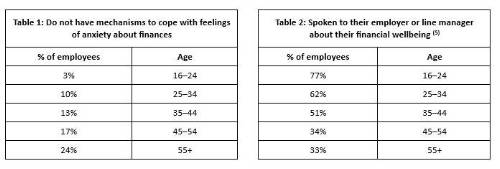The Aviva Working Lives Report 2024: Working for the Future (1) which was published today (03 Sep), is the third consecutive annual in-depth investigation into employer and employee attitudes to the workplace, finances, wellbeing, and planning for retirement.
The new research by Aviva – the number one workplace pension provider in the UK (2) – found that almost three-quarters of employees (73%) said the cost-of-living crisis has made them feel more anxious (3) about their finances. However, only 56% of employers think their employees are worried (4) about their financial wellbeing. This might be because people are not talking about it, with half of employees (50%) having not talked to their current employer or line manager about their financial wellbeing.
It is encouraging that employers are taking action to support their people with more than three-quarters (76%) with initiatives in place to encourage employees to talk to their managers about financial concerns. While more than one in five employers (21%) do not actively encourage employees to talk about their financial concerns, this has improved from 34% last year.
The research suggests that many people are suffering from some level of financial avoidance with one in five employees (20%) choosing not to think about their finances. People experiencing financial avoidance might actively shy away from managing their finances, which might mean not paying bills or checking financial statements.
Almost half of employees (49%) talk to friends or family to help cope with feelings of anxiety about their finances, only 6% talk to colleagues or a manager and 6% talk to a financial adviser. However, 14% don’t have any coping mechanisms.
Younger people are more likely to talk about their financial concerns, whereas older people are more likely to not have any coping mechanisms (Table 1 and Table 2).

Emma Douglas, Director of Workplace Savings & Retirement said: “Financial wellbeing is a critical part of a person’s welfare, and it might be a surprise to some that it is more about a person’s attitude to money and how they feel, rather than a number in their bank balance or pension fund.
“These attitudes can be based on a range of factors, including a person’s experience of handling money, their background, and their level of personal finance knowledge.
“If someone is anxious or stressed about money it’s likely to have a detrimental impact on their mental and physical health too. Employers are increasingly looking to offer information and a range of support services and tools designed to help improve the financial wellbeing of their people. But individuals’ needs vary hugely, so it’s important that services can be tailored to support these diverse needs: from help with bills and budgeting to retirement planning.
“People can take small steps to manage their financial wellbeing which might include tracking down lost pensions, making a plan for retirement, or checking whether their employer provides an Employee Assistance Programme (EAP).”
Some employers will be able to offer financial education either through a specialist provider or an Employee Assistance Programme (EAP). But if not, there are a number of 24/7 helplines and online resources at hand that can offer information about financial issues.
Aviva recently launched its ‘Find and Combine’ pension tracing service. It also provides a range of online retirement tools and calculators.
There is also supplementary help available through Pension Tracing Service, Money and Pension Service, MoneyHelper, and Pension Wise.
Emma Douglas said: “At Aviva, we’re developing a new online financial wellbeing tool which – once it’s ready - will use technology to deliver more personalised support for our corporate workplace pension scheme customers. It will offer an action plan and a series of tangible bitesize steps — education guidance, advice, or coaching services — that can address current financial needs and help reduce stress and anxiety around money issues.”
In 2023, Aviva provided financial education seminars to over 56,000 workplace pension scheme members which are designed to improve understanding and support better financial planning. The seminars are free to Aviva workplace pension scheme members through their employer and provide a wide range of information on pensions, budgeting, saving money on household bills, understanding debt, and money problems.
|

